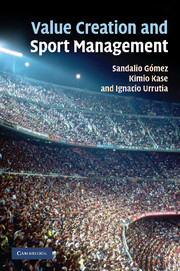Book contents
- Frontmatter
- Dedication
- Contents
- List of figures
- List of tables
- List of contributing authors
- Foreword
- Introduction
- 1 The virtuous circle of value creation in the sports industry
- 2 Value creation and performance criteria for sport entities
- 3 National context and profit strategy of the sport entity
- 4 Value creation in two of the most prestigious Spanish football clubs
- 5 The proto-image of Real Madrid
- 6 Value creation from the organizational structure of a sports entity
- Appendix I Why NGOs matter for the success of sporting events
- Appendix II Strategic evaluation of sponsorship and patronage
- Appendix III Structural characteristics of sport organizations
- Index
- References
Introduction
Published online by Cambridge University Press: 05 February 2014
- Frontmatter
- Dedication
- Contents
- List of figures
- List of tables
- List of contributing authors
- Foreword
- Introduction
- 1 The virtuous circle of value creation in the sports industry
- 2 Value creation and performance criteria for sport entities
- 3 National context and profit strategy of the sport entity
- 4 Value creation in two of the most prestigious Spanish football clubs
- 5 The proto-image of Real Madrid
- 6 Value creation from the organizational structure of a sports entity
- Appendix I Why NGOs matter for the success of sporting events
- Appendix II Strategic evaluation of sponsorship and patronage
- Appendix III Structural characteristics of sport organizations
- Index
- References
Summary
As an opening to the book, this introduction will address three issues:
(1) the significance of our research on sport-related phenomena;
(2) the basic approach or the common thread to/regarding their study; and
(3) the basic structure of this book.
Firstly, we refer to the significance of this research. Sport, with a capital ‘S’, has acquired a status in society that would have been unthinkable only twenty years ago. As a spectacle and as an activity, sport has traditionally been confined to the leisure sphere. In recent decades, however, it has become a full-blown business, one that not only stirs passions but also captures media attention around the world and generates more economic activity than even the most optimistic could have imagined.
Sport occupies an increasingly prominent place in social life, as anyone who watches the television news will know. There are endless radio and television programmes about sport, and even dedicated sports channels. The social spotlight on all things sport-related has made many sportspeople, coaches and managers famous: they have become media personalities and are often held in greater awe than politicians and other public figures.
The far-reaching transformation of the world of sport has been driven by rapid commercialization, which has reached a point where it is quite legitimate to talk of a ‘sports business’ (Beech and Chadwick, 2004: 496) or ‘sports industry’ (Foster et al., 2005: 512). Two examples of the global importance of sport are the growth of the Olympic movement and the growth of football (Amara et al., 2005). To appreciate the transformation, we need only compare the budget and audience of the 1988 Olympics, just twenty years ago, with those of the recent Beijing Olympics, in which billions of dollars were in play, an entire country was brought to a halt and the host country’s economy and image were transfigured.
- Type
- Chapter
- Information
- Value Creation and Sport Management , pp. 1 - 6Publisher: Cambridge University PressPrint publication year: 2010



